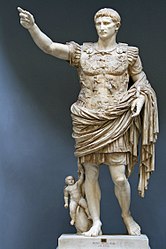
The month of August, which we have just lived through again, was named after Roman Emperor Augustus when the Romans inserted it into the calendar along with July for Julius Caesar. That meant that September, which was so named because it was originally the seventh month, became the ninth month. That made the calendar more accurate, but not the name. I guess they thought having a more accurate calendar was more important than naming the months accurately. And maybe since July and August are so hot, maybe their brains melted, so they didn't think to rename September "November" instead. Or they thought time had just melted away. We could have avoided all this confusion if we had adopted the names decided upon in the French Revolution, which were based on the weather itself.

Emperor Augustus Caesar
But what's in a name? Quite a bit, I guess, because I want to go to the source and talk about someone named August. I had several Augusts to choose from. I thought about Emperor Augustus. He was an important dude. And then there's the character in a favorite movie of mine, "The Ultimate Gift", which was a 2006 hero's journey story that I correlated to the story told by the trump cards in the tarot deck. Each numbered character or image in the cards trumps the number before, thus telling the story. Trump number 4 out of 21 is The Emperor, which I correlated to the character of Gus, short for August, (whose favorite song was "Crazy"), who owned a vast realm of Texas real estate, and who made the young hero (named Jason perhaps after another famous hero of another such story) work hard at his ranch to learn the value of work, which as a spoiled, fun-loving but ungrateful rich guy he didn't know about. Gus was played by the late Brian Dennehy. But, I guess I don't like to work hard either, and I'm not much of a hero, so I didn't choose this bossy emperor either.
Meet Gus and Jason in this video:
Then of course there's Saint Augustine, famous for defining original sin and confessing his own sins, but whose best contribution was to explain how nothing compares to God's glory, and who anticipated Descartes' proof of the soul, which is how we know what we know. His description of time is also epic. Augustine wrote "The City of God" to contrast the emerging medieval realm of followers of Christ, born during the reign of Emperor Augustus, with the fallen City of Rome and its worldly empire.
But the August that most came to my mind when I thought about which one to write about was another character, this one from the Perry Mason series, the episode called "The Counterfeit Crank", whom this character was. No sooner had I thought about this character named August when I saw this episode again last month in August. Now, the name means someone who is revered, or held in high regard, or solemn and dignified. But this character, August "Gus" Dalgran, whose name was repeated often during the show, seemed the opposite of that. He was a generous man, the elderly owner of a successful real estate firm, and he gave away a lot of his money. Early in the show he offered his two partners, Jay Fenton and Don Morley, some Christmas cash, but since the firm was now in severe financial and possibly legal trouble, they refused the offer. So he threw the cash out of the office window into the busy street below, causing a disturbance for which he was arrested. He pretended to be going crazy as his defense, but then pleaded guilty, saying he thought it was OK to give away his own money if he felt like it. He thought his nephew Kenneth was a fine boy, and he helped raise him and finance him, and the young man pretended to be grateful and loyal. But in fact he cooked up a scheme to declare his uncle incompetent so he could take over the company and transfer ownership to himself. He enlisted August's partner Jay Fenton, who was concerned about the firm's decline under August's leadership, into the plan, and forged Jay's and August's name to documents.
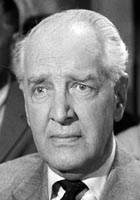
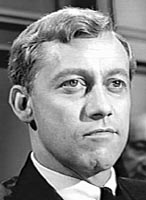

Left to right: Otto Kruger as August Dalgran, Don Dubbins as Kenneth Dalgran, and John Larkin as Jay Fenton
(The 3 principle characters: Perry's client, the murder victim, and the killer)
Fenton and Morley, in order to save the company, wanted August to sell the land which he was planning to turn into a new city, his fondest dream. When he found out that his nephew, who was appointed his conservator, was selling the land against his fervent wishes, the declared-incompetent uncle got mad and threatened to kill his nephew, and escaped from the sanitarium his nephew had put him in. In reality, the land was being sold to Kenneth himself and Jay Fenton, and Kenneth planned to kill his uncle and make it look like suicide so he would inherit everything. But Jay objected to this, and Kenneth threatened to kill Jay, and the proverbial "we struggled, and the gun went off" happened. But it was August who was charged with his nephew's murder. The apparently not-so-august August tried to defend himself by pretending to be crazy again, but Perry uncovered the truth.
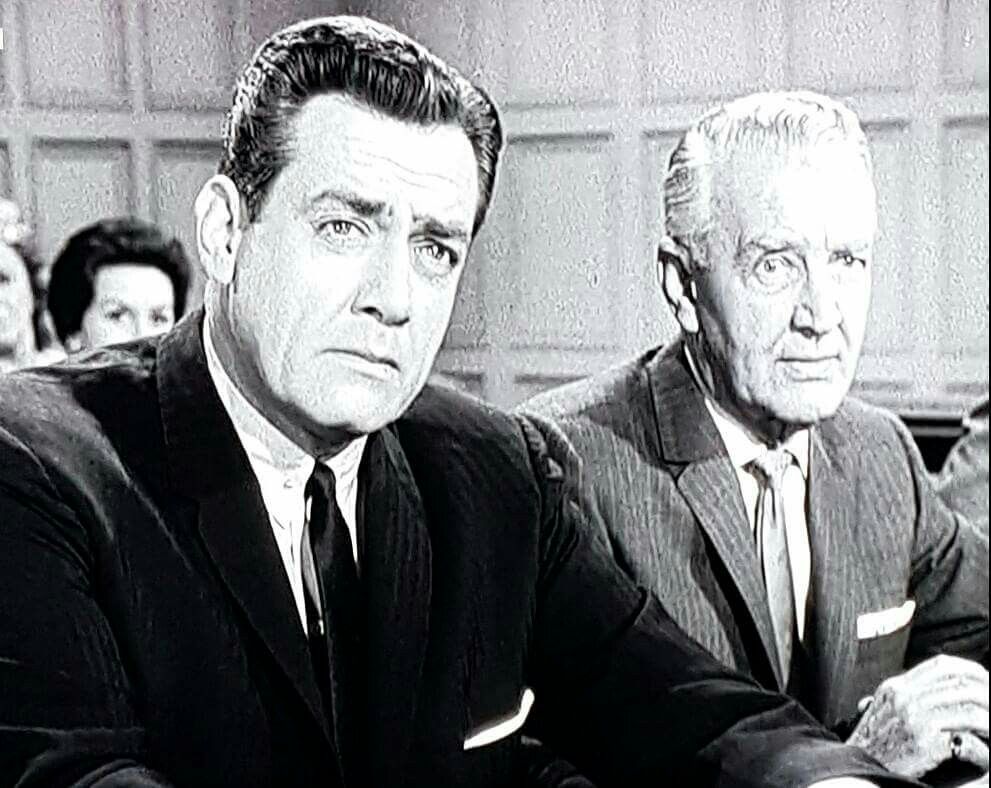
Perry Mason in the Case of the Counterfeit Crank
The land which was August Dalgran's dream, and which his nephew wanted to own, was, unknown to August and his partners, going to be very valuable because a defense industrial plant would be built there. Dalgran City would grow up around it. Kenneth's wife Sandra had already been carrying on an affair with August's partner Don Morley, and they became August's new partners.
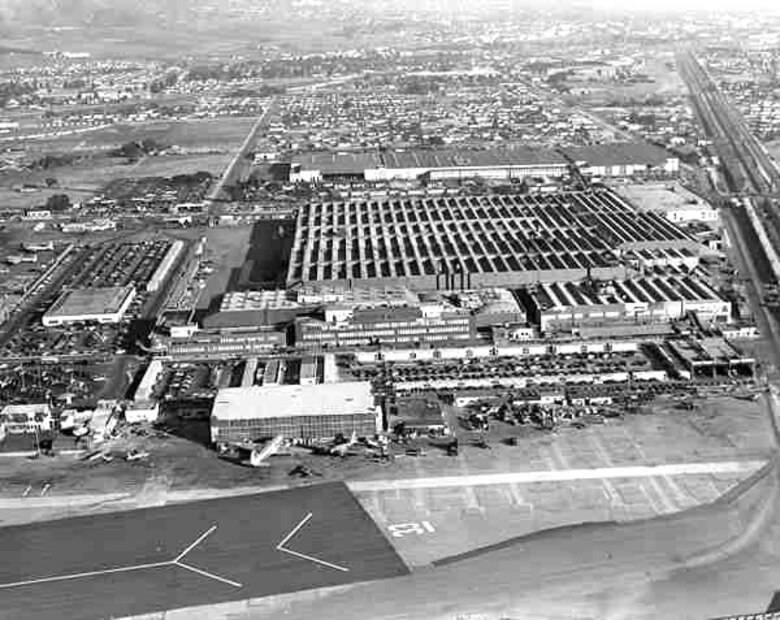
World War 2 LA defense plants, a good approximation to what a 20th century California defense industrial city might look like.
But just like I finished the story about what happened to the alien in Justin Bieber's backpack, I see an unfinished story here about August Dalgran and his city. I will proceed briefly to tell it now. This Perry Mason story was originally broadcast in 1962. August Dalgran was played by the 76-year old Otto Kruger, who was born on Sept.6, 1885 and died on Sept.6, 1974. The once-again very-august August Dalgran lived to see his thriving new city built in the Cold War days of the mid-1960s, but his partners were only in their thirties. They married and had a son named Don Junior. By the time August died in the mid-70s, the Cold War was starting to wind down. The Vietnam War was ended and the people had turned against it. Then in 1989 the Cold War ended. By the early 1990s the new partners Don Senior and Sandra Morley were now in their sixties, and Don Junior was their heir. Don Senior had become something of a crank himself, and gave away a lot of his money. He had spent a lot of time too in Hollywood as a singer and actor. Naturally, like Kenneth Dalgran before him, Don Jr. worried that not much would be left of his inheritance due to his father's cranky and generous ways, since his own father was now taking after his father's old partner August. And the city was beginning to decline because the defense industry was downsizing.
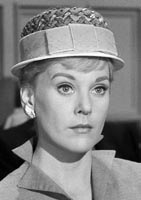
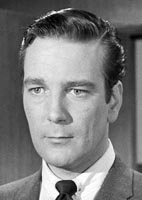
Connie Hines as Sandra, and Michael King as Don Morley
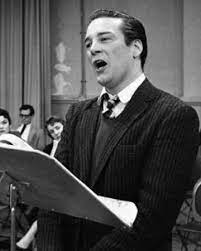
John Michael King aka Michael King singing in My Fair Lady, as Don Morley Senior.
So Don Junior hatched his own scheme to steal his father's money and sell his property. He couldn't quite bring himself to follow in Kenneth's footsteps and try to kill him, but he thought he could drive his father crazy and have him committed to a sanitarium, and make himself conservator. Junior tried playing in a rock band, which drove his father crazy because he preferred broadway musicals. Then he tried gaslighting, creating situations that didn't exist to make Senior think he was seeing things. All this didn't work, because Don Senior's great generosity and stardom made him a respected and august member of the community, so he was not likely to be declared crazy. But his son's disloyalty disturbed him, and finally drove him to an early death in the late 1990s. Unfortunately, Senior had become so mad at his son that he had disinherited him and had willed all his money and property to his wife Sandra instead. This drove Junior crazy instead of Senior, and he committed suicide.
Sandra sold the declining city to Greenpeace, and the organization inherited her money too. Dalgran City became a green city, dedicated to peace and ecology instead of war, and every Christmas they celebrate their august founder August Dalgran's generosity by inviting everyone to throw some cash out of their window.

Perry Mason series, by wikipedia
IMDB article on The Case of the Counterfeit Crank with watch options
Perry Mason Moments Quotes and connections between actors on my favorite TV show
Tarot and The Ultimate Gift movie
Green City by Stephen Longfellow Fiske